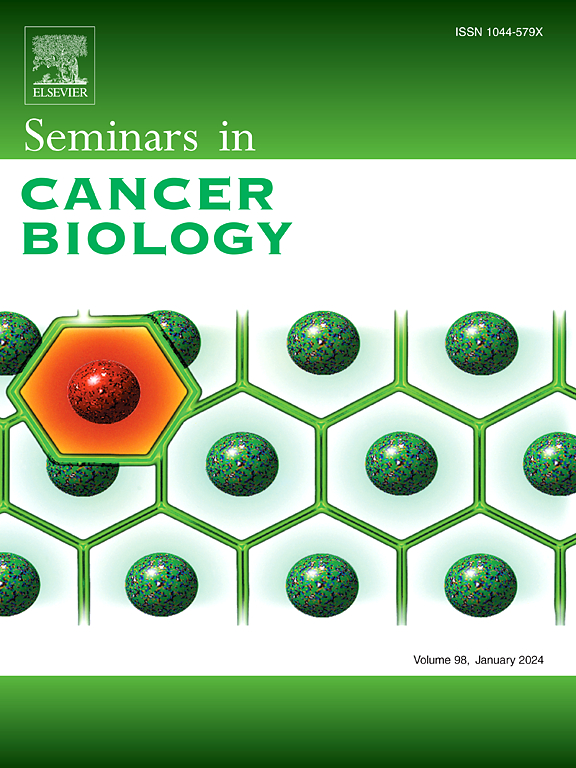Microorganisms in cancer tertiary lymphoid structure formation
IF 15.7
1区 医学
Q1 ONCOLOGY
引用次数: 0
Abstract
Tertiary lymphoid structures (TLSs) are essential in cancer immunotherapy, markedly improving the efficacy of immune checkpoint blockade (ICB) therapy. The presence of TLSs within the tumor microenvironment (TME) is associated with improved responses to ICB therapy, making them valuable biomarkers for predicting the efficacy of ICB therapy. Recent studies have demonstrated that diverse microorganisms—including bacteria, viruses, and eukaryotes such as fungi—impact the effectiveness of ICB treatments. Notably, studies also emphasize that specific microorganisms contribute to the development of TLSs. However, the interactions between microorganisms and TLSs are complex, and the specific mechanisms by which microorganisms impact TLS formation remain largely unknown. This review summarizes emerging advances on the formation processes of TLSs, focusing on the involved signaling pathways, and discusses how microorganisms facilitate TLS formation by affecting these pathways, chemokines, antigen presentation, and immune cells. Understanding these relationships could help in identifying microorganisms, chemokines, and signaling pathways as diagnostic or prognostic biomarkers in cancer, as well as new therapeutic approaches and potential targets for cancer treatment.
微生物在癌症三级淋巴结构形成中的作用。
三级淋巴样结构(TLSs)在癌症免疫治疗中是必不可少的,它显著提高了免疫检查点阻断(ICB)治疗的疗效。肿瘤微环境(TME)中TLSs的存在与ICB治疗反应的改善有关,使其成为预测ICB治疗疗效的有价值的生物标志物。最近的研究表明,包括细菌、病毒和真核生物(如真菌)在内的多种微生物会影响ICB治疗的有效性。值得注意的是,研究还强调特定的微生物有助于tls的发展。然而,微生物与TLS之间的相互作用是复杂的,微生物影响TLS形成的具体机制在很大程度上仍然未知。本文综述了TLS形成过程的最新进展,重点介绍了涉及的信号通路,并讨论了微生物如何通过影响这些通路、趋化因子、抗原呈递和免疫细胞来促进TLS的形成。了解这些关系有助于确定微生物、趋化因子和信号通路作为癌症的诊断或预后生物标志物,以及新的治疗方法和癌症治疗的潜在靶点。
本文章由计算机程序翻译,如有差异,请以英文原文为准。
求助全文
约1分钟内获得全文
求助全文
来源期刊

Seminars in cancer biology
医学-肿瘤学
CiteScore
26.80
自引率
4.10%
发文量
347
审稿时长
15.1 weeks
期刊介绍:
Seminars in Cancer Biology (YSCBI) is a specialized review journal that focuses on the field of molecular oncology. Its primary objective is to keep scientists up-to-date with the latest developments in this field.
The journal adopts a thematic approach, dedicating each issue to an important topic of interest to cancer biologists. These topics cover a range of research areas, including the underlying genetic and molecular causes of cellular transformation and cancer, as well as the molecular basis of potential therapies.
To ensure the highest quality and expertise, every issue is supervised by a guest editor or editors who are internationally recognized experts in the respective field. Each issue features approximately eight to twelve authoritative invited reviews that cover various aspects of the chosen subject area.
The ultimate goal of each issue of YSCBI is to offer a cohesive, easily comprehensible, and engaging overview of the selected topic. The journal strives to provide scientists with a coordinated and lively examination of the latest developments in the field of molecular oncology.
 求助内容:
求助内容: 应助结果提醒方式:
应助结果提醒方式:


